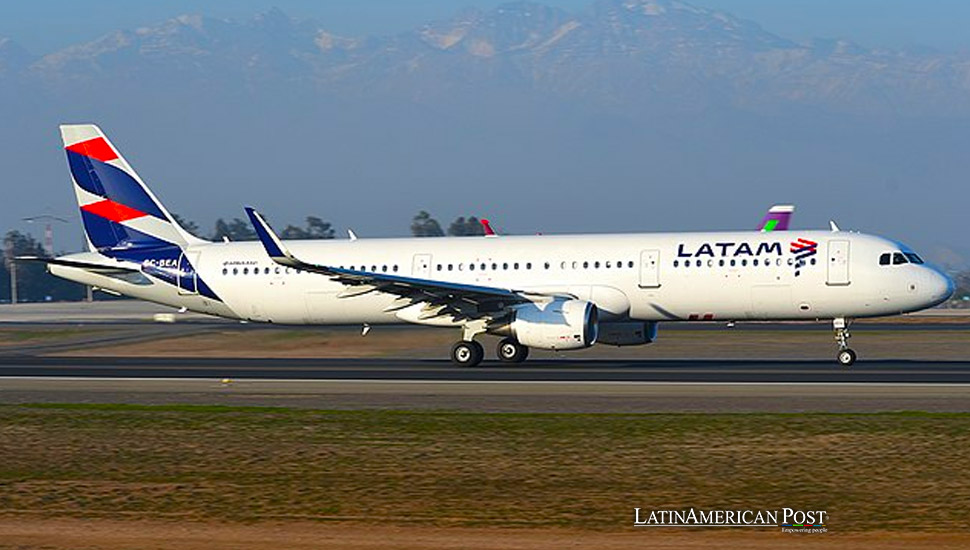LATAM Airlines Eyes Embraer Deal to Expand Brazilian Fleet

LATAM Airlines is considering purchasing up to 30 aircraft from Brazilian manufacturer Embraer as part of its expansion in Brazil, which could significantly impact the airline industry and the regional economy.
LATAM Airlines, the leading carrier in Brazil by market share, is exploring an ambitious expansion plan to acquire up to 30 new aircraft from Brazilian planemaker Embraer. This potential deal, as revealed by Brazil’s Ports and Airports Minister Silvio Costa Filho, underscores LATAM’s commitment to strengthening its presence in Latin America’s largest economy. The airline’s growth strategy comes when demand for air travel in the region steadily recovers from the pandemic, making fleet expansion a crucial step in maintaining its competitive edge.
The expansion plan, however, is not just about increasing the number of planes in LATAM’s fleet. It’s also about enhancing the airline’s operational efficiency and flexibility by integrating smaller aircraft capable of effectively serving regional routes. Jerome Cadier, LATAM Brazil’s CEO, recently hinted at adding smaller jets to the fleet, such as Embraer’s E2 series or Airbus’ A220, designed for the regional market segment of up to 150 seats. This strategic addition would allow LATAM to serve Brazil’s diverse geography better, connecting more remote areas with major urban centers, thereby boosting regional connectivity.
The potential acquisition of Embraer aircraft is particularly significant for Brazil because it supports a local manufacturer and aligns with the government’s broader goals of enhancing regional aviation. This move could also mean faster delivery times for LATAM, as global supply chain disruptions have extended the wait for new narrowbody jets from other major manufacturers like Airbus and Boeing.
The Government’s Role in Shaping the Deal
Brazil’s government has been vocal about its desire to see domestic airlines support local industry, particularly Embraer, a vital player in the country’s aerospace sector. The government’s interest in this potential deal is not merely about boosting Embraer’s sales but also ensuring that Brazil remains competitive in the global aviation market. The government aims to strengthen the national economy and create jobs in the high-tech aerospace sector by encouraging local carriers like LATAM to purchase Embraer aircraft.
Minister Silvio Costa Filho highlighted the government’s involvement in discussions with LATAM and Embraer, noting that while the government cannot impose a deal, it is keen on facilitating one that benefits all parties involved. “LATAM has indeed opened talks with Embraer, and we have been working so they can analyze a purchase of Embraer planes. But we cannot impose a deal; that would be incomprehensible and a very bad sign for free markets,” Costa Filho stated. This balanced approach reflects the government’s commitment to supporting local industry while respecting the principles of free market competition.
The potential deal also ties into the government’s broader strategy of promoting regional aviation. By expanding the fleet with aircraft designed for shorter routes, LATAM would be better equipped to enhance regional connectivity, a key goal for the Brazilian government. This would not only make air travel more accessible across the country but also stimulate economic growth in less developed regions by improving access to markets, services, and opportunities.
The Strategic Value of Embraer’s Aircraft
Embraer’s E2 series, which is among the aircraft under consideration by LATAM, represents a significant advancement in regional aviation technology. These jets are known for their fuel efficiency, lower operating costs, and ability to operate on shorter runways, making them ideal for Brazil’s diverse and often challenging topography. For LATAM, acquiring these aircraft would mean being able to offer more direct flights between smaller cities and major hubs, reducing travel times and enhancing the passenger experience.
The strategic value of incorporating Embraer’s aircraft into LATAM’s fleet extends beyond operational efficiency. It also positions the airline to capitalize on growing demand for regional air travel, particularly as Brazil continues to recover economically from the COVID-19 pandemic. Smaller, more fuel-efficient planes like the E2 could help LATAM optimize its route network, offering more frequent flights on less busy routes without the financial risks associated with operating larger, less adaptable aircraft.
Additionally, a deal with Embraer would likely strengthen LATAM’s ties with Brazil’s industrial sector, potentially leading to further collaboration in areas such as maintenance, training, and innovation. As the global aviation industry faces increasing pressure to reduce its carbon footprint, Embraer’s focus on sustainability and innovation in aircraft design could provide LATAM with a competitive edge in an increasingly eco-conscious market.
Implications for the Broader Aviation Market
The potential acquisition of 30 Embraer aircraft by LATAM would have significant implications for the broader aviation market, both in Brazil and across Latin America. For Embraer, securing such a deal would be a major boost, reinforcing its position as a leading manufacturer of regional jets and strengthening its financial stability in a highly competitive industry. The deal would also send a strong signal to other airlines in the region, encouraging them to consider Embraer as a viable option for fleet expansion.
For the Brazilian aviation market, this move could trigger a ripple effect, prompting other airlines to reassess their fleet strategies in light of LATAM’s decision. If LATAM’s expansion with Embraer jets proves successful, it could lead to increased demand for regional aircraft across the continent, further cementing Embraer’s role as a key player in Latin American aviation. Moreover, the success of this partnership could attract more foreign investment into Brazil’s aerospace sector, driving innovation and job creation.
On a global scale, the deal would highlight the growing importance of regional aviation as airlines adapt to shifting passenger demands and economic realities. As the world emerges from the pandemic, the ability to operate efficiently on regional routes will be crucial for airlines seeking to rebuild and expand. LATAM’s potential acquisition of Embraer aircraft could position it as a leader in this space, setting an isexample for other carriers navigating the post-pandemic recovery.
Also read: Brazilian Court Denies X’s Request to Exempt Subsidiary from Legal Responsibility
LATAM Airlines’ consideration of up to 30 Embraer aircraft as part of its fleet expansion strategy is a significant development for the Brazilian aviation industry and the broader regional economy. This potential deal not only underscores the strategic importance of regional aviation but also highlights the critical role of government support in fostering industrial growth. As LATAM navigates its expansion in Brazil, the outcome of these negotiations could shape the future of air travel across Latin America, driving economic growth and enhancing connectivity in ways that benefit both the airline and the communities it serves.





